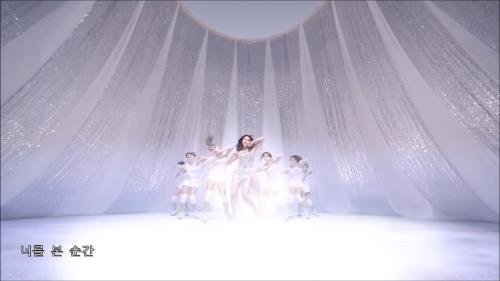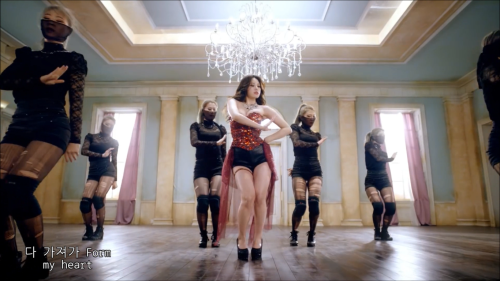#케이팝
안녕하세요 여러분! Hey everyone! I got another request for a K-pop breakdown, so here it is! This one was pretty tricky for me to break down, but I hope it all makes sense anyways! If you have a song you’d like to see me break down, let me know and I’ll try to fulfill it!
You can listen to this song here! I used lyricstranslate.com’s really good translations and Naver Dictionary to help me out. As usual, I linked my full-length lessons about the grammar structures mentioned if you want to learn more about them! Let’s start!

휘하고 멋지게 솟구치는 눈은 / 이별에 손짓인 듯 부서지는 / 밤으로 가득한 고요를 본다
The snow that soars up majestically with a whoosh / Sees the silence full of night / That is shattered by our goodbye as if it were a gesture
- 휘하다 -> I can’t find a related translation for this word on Naver Dictionary, but just going off the translations from lyricstranslate, it means “with a whoosh.”
- 멋지다 can mean anything from “nice” to “awesome” to “charming.”
- [adjective stem] + 게 turns that adjective into an adverb.
- -고is attached to stems to mean “and.” So 휘하고 멋지게 means “with a whoosh and majestically.”
- 솟구치다 = soar; gush; surge
- 눈 = snow
- [verb] + 는 + [noun] = [noun] that [verbs] -> This is how you describe nouns with verbs in the present tense.
- -은 is a topic particle that shows that 눈 is the topic of the sentence. More about particles here!
- 이별 = farewell; goodbye
- 에 = is a location particle meaning “to” or “in.” In this context, however, it means “by,” as in “shattered by.”
- 손짓 = hand gesture
- [noun] + 인듯 = as if it is [noun]
- 부서지다 = break; be broken; be shattered
- 밤 = night
- 가득하다 = full [of smth]
- -(으)로 in this context means “with” or “of,” as in “filled with night” or “full of night.”
- 고요 = silence
- 보다 = to see
- [verb stem] + ㄴ/는다 or [adjective stem] + 다 is known as the plain style or narrative form. This type of speech doesn’t really have a formality level. You see it a lot in books and newspapers where there’s not really a specific formality level you’re using. It can also be used with those who you would speak informally to.
돌아보는 여운이 안타깝다 / 숨을 쉰다 눈이 온다 / 인사한다 잠이 든다
The afterglow is full of regret / Breathing, snowing / Greeting, falling asleep
- 돌아보다 = to look back
- 여운 = resonance; lingering feeling; echo
- I think 돌아보는 여운 literally means “the resonance I looked back on” or something like that.
- 안타깝다 = regrettable; sad
- 숨을 쉬다 = to breathe
- 눈이 오다 = to snow (literally “snow comes”)
- 인사하다 = to greet
- 잠이 들다 = to fall asleep
- When conjugated into the plain style, the ㄹ gets dropped and replaced with -ㄴ다 because it’s irregular.
떠나간다 / 떠나간다 / 남은 것은 이제 없다
Leaving / Leaving / Now there’s nothing left
- 떠나가다 = to leave
- 남다 = to remain; to be left
- 남은 것 = what’s left; the things that remain
- 이제 = now
- 없다 = to not be there; to not exist; to not have
그대가 웃는 걸 보면서 나도 웃는다 / 발자국에 아쉬움 꾹 묻어둔 채로
As I look at you smile, I smile too / Burying my regret in my footprints
- 그대 = You -> this is a more romantic way of saying “you” that you would say to your partner.
- 웃다 = to smile; to laugh
- 웃는 걸 refers to the fact that you’re smiling. The action of you smiling is turned into a noun, and that is what the speaker is looking at.
- [verb stem] + (으)면서 means “as one [does verb]” and is used for when two actions are done simultaneously.
- 나 = I (informal)
- -도 = too
- 발자국 = footprints
- 아쉽다 = be a shame; be a pity
- 아쉬움 is the noun form of 아쉽다 courtesy of -ㅁ nominalization.
- 꾹 = firmly; completely
- 묻어두다 = hide; bury; conceal
- -ㄴ 채로 describes the state that something is in as an action is being done. In this case, the speaker is smiling with her heart buried – her heart is in the state of being buried as she is smiling.
That’s all for this breakdown – I hope it was helpful! See you in the next lesson! 다음에 또 봐요!
- My masterlist
- Joinmy Discord chat here to practice Korean with others!
- Follow me onInstagram herefor more Korean content!
- GetDrops Premium usingmy affiliate linkto expand your Korean vocab!
- Check out myKo-Fi to support this blog and my studies! Thank you for your generosity!
안녕하세요! Hey everyone! Here is yet another breakdown request fulfilled! If you have a song you’d like to see me break down, let me know and I’ll try to fulfill your request!
You can listen to this song here! I used Genius’s translationsandNaver Dictionary to help me out with this breakdown! I also linked my full-length lessons about the grammar structures featured in this song if you want to learn more about them. Let’s start!

사랑 촌스런 그 감정 / 근데 내 가슴이 뛰어 / 왜 나 이래 나?
Love, that old-fashioned feeling / But why is my heart racing? / What’s wrong with me?
- 사랑 = love
- 촌스런 -> from 촌스럽다, meaning “old-fashioned”
- 그 = that (must be placed before a noun)
- 감정 = feeling
- 근데 can usually be translated as “but” – it is sometimes used to draw attention to a different topic or something contrasting to what is currently being spoken about.
- 내 = my (informal)
- 가슴 = heart; chest
- -이 is a subject particle – more about particles here!
- 뛰다 = to run; to jump
- 왜 = why
- 이래 comes from 이렇다, meaning “to be like this” or “to do this.” This line literally means “why am I like this?” but can also mean “what’s wrong with me?”
나도 모르게 when you call my name / 가슴 아프게 나의 심장이 쿵쿵
Unknowingly, when you call my name / Heartbreakingly, my heart is pounding
- 나 = I/me (informal)
- -도 = too/even (depending on context)
- 모르다 = to not know
- Adding-게 to a verb or adjective stem turns it into an adverb. 나도 모르게 means “unknowingly” or, more literally, “without me even knowing.”
- 아프다 = to be sick; to hurt
- 나의 = another way to say “my.” -의 is a possessive marker.
- 심장 = heart -> This refers more to the heart, while 가슴 can mean either “heart” or “chest.”
- 쿵쿵 is an onomatopoeia and is supposed to mimic the sound of a heartbeat.
내 뜻대로 되지 않아 / 흔한 filter조차 없어
It’s not going my way / I don’t even have any trendy filter
- 내 = my (informal)
- 뜻 = meaning
- -대로 = according to [smth]; as [smth]
- 되다has a few different meanings. In this case, it’s a little hard to translate directly, but I would say it means “to go” (as in to go a certain way) or “to be done” (as in something is done some way).
- -지 않다= not / does not
- More literally, I think this line means “It’s not going according to my meaning.” As with a lot of K-pop lyrics (and Korean in general), it’s best to focus on the meaning rather than the literal English translation, so don’t worry too much if the translation sounds odd!
- 흔하다, according to Naver Dictionary, means “common” or “commonplace.” Not quite sure why Genius translated it as “trendy,” but I guess if something is trendy, it becomes common because everyone is using it.
- [noun] + 조차 = even [noun]
- 없다 = to not be there / to not have
That’s about it for this breakdown! I hope it was helpful :) See you in the next lesson! 다음에 또 봐요!
- My masterlist
- Joinmy Discord chat here to practice Korean with others!
- Follow me onInstagram herefor more Korean content!
- GetDrops Premium usingmy affiliate link to expand your Korean vocab!
- Check out myKo-Fito support this blog and my studies! Thank you for your generosity!
안녕하세요! Hello again everyone! I have yet another breakdown that was requested! If there’s a song you want to see broken down, let me know and I’ll try to fulfill your request!
You can listen to this song here! I used colorcodedlyrics.comandNaver Dictionary to help me translate these lyrics! I also linked my full-length lessons about the grammar structures featured in this song if you want to learn more about them. Let’s start!

거울 속에 마주친 얼굴이 어색해서 / 습관처럼 조용히 눈을 감아 / 밤이 되면 서둘러 내일로 가고 싶어
The face in the mirror is awkward / So like a habit I quietly close my eyes / When the night comes I want to hurry up and go to tomorrow
- 거울 = Mirror
- 속에 = Inside
- 마주치다 = to meet (usually refers to eyes meeting)
- 얼굴 = face
- -ㄴ/은allows you to describe nouns with that verb in the past tense. So 마주친 얼굴 literally means “the face that I met.”
- -이 is a subject particle – more about particles here!
- 어색하다 = awkward
- -아/어서 means “so” or “because.” 어색해서 means “because it’s awkward” or “it’s awkward, so…”
- 습관 = habit
- [noun] + 처럼 = like [noun]
- 조용하다 = quiet; 조용히 = quietly
- 눈 = eye(s)
- 감다 = to close (when talking about eyes)
- 밤 = night
- 되다 = to become (밤이 되다 literally means “to become night”)
- -(으)면 = if/when
- 서두르다 = to rush; to hurry
- 내일 = tomorrow
- -(으)로in this context means “to” or “towards.”
- 가다 = to go
- [verb stem] + 고 싶다 = I want to [verb]
설렘으로 차오르던 나의 숨소리와 / 머리 위로 선선히 부는 바람 / 파도가 되어 어디로든 / 달려가고 싶어 / 작은 두려움 아래 천천히 두 눈을 뜨면
My breath that rose up with excitement / And the wind that blows coolly above my head / I want to become a wave / And run anywhere / When I slowly open my eyes under the small fears
- 설렘 = excitement; thrill
- Here, -(으)로 means “with”
- 차오르다 = to rise up
- 나의 = my (informal) -> 나 means “I,” while -의 is a possessive marker.
- 숨소리 = breath -> refers to the sound of breath
- [verb stem] + 던is another way to describe a noun with a verb. It is used for actions that you used to do repeatedly in the past or that you did but did not complete.
- -와 = and
- 머리 = head
- 위로 = above; top
- 선선히 = coolly
- 불다 = blow
- 불다’s stem ends in ㄹ, which gets dropped when you want it to describe a noun.
- 바람 = wind
- 파도 = wave
- 어디로든 = anywhere
- 달려가다 = to run
- 작다 = small
- 두려움 = fear -> noun form of the verb 두렵다, meaning “afraid”
- 아래 = below; bottom
- 천천히 = slowly
- 두 = two (this is the word for “two” that you put before a noun)
- 뜨다 = to open (eyes)
휩쓸려 길을 잃어도 자유로와 / 더이상 날 가두는 / 어둠에 눈 감지 않아 / 두 번 다시 날 모른 척 하지 않아
I’m free even when I’m swept away and get lost / I won’t close my eyes / in the darkness that traps me anymore / I won’t pretend to not know who I am again
- 휩쓸리다 = to be swept away
- 길을 잃다 = to get lost
- -아/어도 = even though/even if
- 자유롭다 = to be free
- 더이상 = anymore
- 날 = me (informal)
- 가두다 = to trap; to confine; to lock up
- 어둠 = darkness
- -지 않다 = to not [verb/adjective]
- 두 번 = twice
- 다시 = again
- 모르다 = to not know
- -척 하다 = to pretend to [verb/adjective]
That’s about it for this breakdown! Hope it was helpful and fun to read! See you in the next lesson! 다음에 또 봐요!
- My masterlist
- Joinmy Discord chat here to practice Korean with others!
- Follow me onInstagram herefor more Korean content!
- GetDrops Premium usingmy affiliate link to expand your Korean vocab!
- Check out myKo-Fi to support this blog and my studies! Thank you for your generosity!
안녕하세요 여러분! Hey everyone! I got yet another request for a breakdown! If you have a song you’d like to see broken down, let me know! I linked my full-length lessons about the featured grammar points throughout as well in case you want to learn more about them!
I translated all these lyrics myself, but I did refer to this lyric videoandNaver Dictionary to help me out :) Let’s start!
나를 스쳐가는 그대 / 내 말을 들어줘 / 걸음을 멈추고 / 내 노랠 들어줘
You brush against me / Listen to what I have to say / Stop in your tracks / And listen to my song
- 나를 = me
- 나 is the informal way to say “I,” while -를 is an object particle. More about particles here!
- 스쳐가다 = to brush against; to pass by
- 그대 = you -> This is a poetic/romantic way to say “you” and isn’t really used in everyday spoken Korean.
- [verb stem] + 는 allows you to describe nouns with that verb. 나를 스쳐가는 그대 literally means “you who brushes against me.”
- 내 = my (informal)
- 말 = words
- 듣다 = to listen; to hear
- 듣다’s stem ends in ㄷ, so it becomes 들어줘 when conjugated.
- [verb stem] + 아/어주다 means that a verb is done forsomebody and can be used when pleading that someone do something for you. In this case, he’s commanding that you listen to him.
- Literally, this line means “listen to my words.”
- 걸음 = step(s) -> from the verb 걷다, meaning “to walk”
- 멈추다 = to stop
- -고 is a connector that means “and.” This line means “stop in your tracks and…”
- 노래 = song
축 처진 고개들과 / 비틀거리는 그림자 / 그렇게 나는 불청객이 돼 / 아무도 모르는 yeah / 노래를 부르며 yeah
Among the drooping heads / And staggering shadows / I become an uninvited guest / While I sing a song / That nobody knows
- 축 처지다 = droop; hang; sag
- 고개 = head
- Attach -들 to nouns to make them plural
- [verb stem] + ㄴ/은 allows you to describe a noun with that verb in the past tense. So 축 처진 고개들 literally means “heads that drooped.”
- 과/와is attached to nouns to mean “and” or “with.” 과 is attached to nouns ending in a consonant, while 와 is attached to those ending in a vowel.
- 비틀거리다 = stagger; stumble; falter; totter
- 그림자 = shadow(s) (it can still be implied that a noun is plural without the -들 depending on the context!
- 그렇게 = like that
- 불챙객 = uninvited guest
- 되다 = to become
- These lines were a little tricky to translate, but I think it essentially means “the drooping heads and staggering shadows, like that, I become an uninvited guest” as if he is an uninvited guest because the drooping heads and staggering shadows make him one.
- 아무도 = nobody
- 모르다 = to not know
- 아무도 모르다 sounds like a double negative – nobody doesn’t know. But in Korean, this is the correct way to say “nobody knows”! When using indefinite pronouns like 아무것도, 아무데도, (nothing, nowhere), etc., you need to use a negative verb like so.
- 부르다 -> when paired with 노래, means “to sing.”
- [verb stem] + (으)며means “while [verb]” and is used when two actions are happening at the same time.
아무도 모르는 / 노래를 부를래 / 지나가는 너의 / 마음을 붙잡을 수 있길 바라며
I’ll sing a song / That nobody knows / Hoping that I can grasp your heart / As it passes
- [verb stem] + ㄹ/을래(요) means “I will [verb]” or “I want to [verb].” It expresses a strong intention to do something.
- 지나가다 = pass; go by
- 너의 = your(informal)
- 너 means “you” (informal), and -의 is a possessive marker.
- 마음 = hear
- 붙잡다 = grasp; grab; hold
- [verb stem] + ㄹ/을 수 있다 = can [verb]
- [verb stem] + 기를 바라다 = to hope that [verb]
- Those last two lines literally mean “while hoping I can grasp your passing heart.”
That’s about it for this breakdown! Hope it was helpful :) See you in the next lesson! 화이팅!
- My masterlist
- Joinmy Discord chat here to practice Korean with others!
- Follow me onInstagram herefor more Korean content!
- GetDrops Premium usingmy affiliate link to expand your Korean vocab!
- Check out myKo-Fi to support this blog and my studies! Thank you for your generosity!
Hello I am excited to announce that PDF lessons will be coming soon for you to download. In the PDF you will be able to have a more detailed explanation of the grammar and it will also include practice questions too~ Stay tuned!
IToday we are gonna look at one of the most used words in Korean.
그대로 / 이대로/저대로.
Think of 그대로 as 그렇게 ,이대로 as 이렇게, and 저대로 as 저렇게 They have the same meanings but 그대로, 이대로 are stating it as a form or a way.rather than being straight forward as 이렇게 그렇게, 저렇게 .
Let us look at some sentences
그대로:
한: 무서워하지 말고 있는 그대로말해.
영: Don;t be scared just say it as it is
한: 그냥 그들 그대로 내버려 둬
영: Please just leave the things as they are
한: 정말 네가 말한 그대로다.
영: It is just as you said.
한: 이 문장을 문자 그대로영역하시오
영: Translate this sentence into English word for word.
Vocab using 그대로:
그냥 그대로 있다 - To remain as it is
문자 그대로 영역하다 [영어 +번역하다] - To translate in English word for word
문자 그대로 한역하다 - Translate into Korean word for word
문자 그대로 일역하다 - Translate into Japanese word for word.
있는 그대로 - As it is
이대로: Like this / This way
한:그 문장은 이대로도 의미가 통한다
영: The sentence does make sense even as itnow
한:이대로라면 만사가 끝장이다
영: If things go on like this, everything will be ruined
한:이대로 놔두면큰일나겠다
영:If we leave it like this, it will grow into a serious matter.
Vocab using 이대로:
이대로도: Even as it is
이대로라면 : If things are like this.
이대로 놔두면: If sm leaves it like this
만사: Everything
끝장이다 - Ruined
의미가 통한다 - To make sense
저대로:Like that/ That way/as it is
한: 저대로가 좋다
영: I like that better as it is
한: 그 사건을 저대로두어서는 안 된다
영: The matter cannot be allowed to stand as it is.
Vocab using 저대로:
저대로두어서는 안 된다 - not allowed to stand as it is
사건 : Matter
[Credits to Naver Dictionary, Daum Dictionary]
PS. What I mean by vocab using, is that it is just vocab used in the sentence it doesn’t have to go with 그대로,이대로,저대로
This one is used to explain the situation of something that you did in the past/will do later on/ or are doing/. it is similar to even though ( I don’t know what your reasons are ! X) )
제가 1년동안 한국에서 살기는 했지만 아직도 한국말을 잘 못해요
I have lived in Korea for a year but I still can’t speak korean .
서울 항공원 (비행기표) 는 비싸기는 하겠지만 살거에요
The plane ticket to seoul is expensive but I will buy it.
저는 한국 사람이기는 하지만 김치를 먹기 싫어요 I am korean but I hate to eat kimchi.
- 강태빈
In this lesson we will be looking at the grammar structure “전에 ~하지 않았어요?” This is used to ask a question about what someone has done in the past
A: 엘라, 전에 케이팝을 좋아하지 않았어?
B: 응 근데 이제는 요즘 중국 음악을 자주 들어.
영어 해설:
A: Ella, didn’t you used to like K-pop?
B: I used to but now I listen to Chinese music often these days
And that’s how it goes ^^
- 강태빈
I was sitting with my friend bored, and we decided that there are somethings in English that we cannot translate into Korean. So we sat down and had a long think about it.
Pronunciation of difficult slang is in [발음] :)
please re blog this because NO KOREAN uses this yet! Actually NO KOREAN except for my closest friends use this slang so please please share with your Korean friends too! I would like to see AOA use the phrase 큐섹! :)
Here are the new slang!
Cute and sexy -큐섹하다 큐트(귀엽다) + 섹시하다 (to be sexy)
Adj: 큐섹한 Adv: 큐섹하게 Noun: 큐섹함
e.g 오늘은 큐섹한 원피스를 샀어요.
큐못남 [큐몬남]- Cute but Ugly boy (귀엽다+못생긴 + 남자)
큐못녀 [큐몬녀] - Cut but ugly girl (귀엽다+못생긴 + 여자)
큐핫남 [큐한남] - Cute and sexy boy (귀엽다 + 핫 (완전 섹시한) 남자)
큐핫녀 [큐한녀] - Cute and sexy girl (귀엽다 + 핫 (완전 섹시한) 여자)
섹똑하다 - Sexy and smart (섹시하다 + 똑똑하다)
배피다 - To be hungry and tired (배고프다 + 피곤하다)
온괴자 - A cyber bully (온라인 + 괴롭히다)
온괴하다 - To cyber bully (온라인 + 괴롭히다)
늦온남 /늦온녀 - Someone who comes online late and makes bad excuses (늦게 + 온라인 + 남/녀)
늦온되다 - To be late online and start making excuses
라소되지 - A greedy person who eats just ramen and soju all day (라면+소주+되지)
라소먹다 - To eat ramen with soju (라면 + 소주 + 먹다)
헤어진크림 먹다 - to eat at icecream after a break up (헤어지다 + 아이스크림 +먹다)
듣싫노래 [듣실노래] A song that is on your playlist that you no longer listen to.
(듣기 싫다 + 노래)
영대왕 - Someone who speaks English like a native (영어 + 대왕)
한대왕 - Someone who speaks Korean like a native (한국어 + 대왕)
노대왕 - Someone who sings really well (노래 + 대왕)
게임대왕 - Someone who has amazing gaming skills (게임+대왕)
한쁜억 - Someone who speaks Korean with a bad accent (한국 + 나쁜 + 억양)
한잘억 - Someone who speaks Korean with a good accent (한국+ 잘 + 억양)
한원남/ 녀 - A guy/girl who wants to be Korean (한국 + 원나비 (되고 싶은) +남/녀)
일원남/녀 can also be used
케중남/녀 - A guy/girl who is addicted to K-pop (케이팝 + 중독 + 남/녀)
메중녀/남 - A girl/guy who is addicted to makeup (메이컵 +중독 +남/녀
싫걸남친 [실걸람친] - A boyfriend who does the things that his girlfriend hates (싫어하는걸+남자 친구)
싫걸여친[실걸려친] - A girlfriend who does the things that her boyfriend hates (싫어하는걸 + 여친)
여친못하다 -To not understand your girlfriend (여자친구 + 못하다)
남친못하다 - To not understand your boyfriend (남자친구+못하다)
첨만얼- someone’s face that you meet the first time(처음 만난 + 얼굴)
첨만얼 보다 - To see someone’s face for the first time.( 처음 만난 얼굴 + 보다)
악데몽[앙데몽] - A really bad date (악몽+ 데이트 = 악(데이트)몽)
좋데꿈 - A really nice / amazing date (좋은 꿈 + 데이트 = 좋(데이트)꿈)
쌤개 - Teachers pet (선생님 + 개)
불합남/녀[불함남/녀] - A boy/girl with the lowest grades (불합격하다 + 남/녀)
짱님 - The best teacher (선생님+짱)
숙까먹다 - To forget your homework (숙제+까먹다)
비커플 - A couple who are dating secretly (비밀+커플)
몰연애하다 - to date secretly (몰래+연애하다)
빌애인 [비래인] - Secret lover (비밀+애인)
올친지애 - A lover who you were friends with for a long time before you dated them, and have just started dating them today. ( 오랫동안 + 친구 + 지금+ 애인)
속어들은 많이 이용하시길 바랍니다. We hope you use these slang words al ot !
속어는 강태빈(Christian Kmachni)과 구아영 (Eden Nkukulu)에 의해 복제되었다.
Quoting in Korean is easy,really it is
Method with using 다니
A: ‘내가 한국에 돌아갈거야’
B: 니가 한국에 돌아가다니 엄청 슬퍼.
A: 어젯밤에는 소희가 잘모르는 남자랑 모텔에 갔어
B: 소희가 잘모르는 남자랑 모텔로 갔다니 궁금해.
‘What person A said’다니 Your response.
This is how it is said. But i have seen more use of 라고 그랬다. and 라고 / 한다고 말했다. But this will be in another point.
Here is the slang that is trending in Korea.
Another 꿀팁 from me and my Girlfriend.
넘나 예쁜것 / 잘생긴것 / 좋은것
Such a pretty / handsome/ good thing etc….
텍스트말
ㅇㅈ = 인정 Admit
E.G: 이 쿠키 엄청 맛있어! ㅇㅈ
I admit this cookie is so yummy.
ㅇㅈ? (Don’t you think so too?)
ㅈㄴ: 존나 (F*cking)
ㅁㅊ: 미친 This is insane / crazy
ㅁㅊ, ㅈㄴ, ㅇㅈ these are very common
포기각: I am about to ~~~
포기각 = I am about to give up / I feel like giving up
: 자살각 = I feel like dying / I’ll kill myself
각 is only used at the now.
E.G
쿠키각 (I want to eat a cookie so badly)
백화점각 (I want to go to department store badly)
서울각 (I want to go to Seoul so badly)
——
Other Slang
꼰대 = Old people who that always try to teach young people (in a bad way)
Typical 꼰대 is : can be a grandfather or old guy,or teacher etc..
인생(Noun) = something you want for ever or will love fore life
인생노래 = Song you will love for life/ cant live without
인생과자 = Snack you cannot live without
인생템 = Item you cannot live with out
etc…..
Hello
For those who have very little Korean vocabulary this song is very basic.
Grammar / Vocab points in this song to get a general message
달콤하다 - To be sweet
잘자요 - Good Night
우리 - My, Our
아기 - Baby
잠든 모습 - Slumbering state/ appearance
들리다 - Listening
얘기 = Talk
처럼 - Like
입술 - Lips
을 위한 - For someone/ or something
마음 = Heart / Mind
잠이 들기 전에 = Before you go to sleep
자정가 - Lulluby
언어로 - In a language









